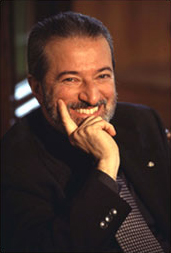Gianmarco Veruggio
The National Geographic article Robot Code of Ethics to Prevent Android Abuse, Protect Humans said
“The government of South Korea is drawing up a code of ethics to prevent human abuse of robots — and vice versa.Gianmarco Veruggio of the School of Robotics in Genoa, Italy, is recognized as a leading authority on roboethics.
‘Robotics is a new science with a manifold of applications that can assist humans and solve many, many problems,’ he said.
‘However, as in every field of science and technology, sensitive areas open up, and it is the specific responsibility of the scientists who work in this field to face this new array of social and ethical problems.’
Technological advances have introduced new models of human-machine interface that may bring different ethical challenges, said Veruggio, the Italian scientist.
‘Think of bio-robotics, of military applications of robotics, of robots in children’s rooms,’ he said.”
Gianmarco Veruggio is President of Scuola di Robotica (School of Robotics) and Senior Research Scientist for CNR – IEIIT. He coined the term “roboethics” and organized the First International Symposium on Roboethics. Today, after many years of commitment to the promotion and to the knowledge of Robotics, Gianmarco is a reference point often consulted by the media on technological innovations and scientific development in the field, on ongoing and future research projects, and on the application of Robotics and ICT in manufacturing and R&D.
From 1980 to 1983 Gianmarco worked as a designer of fault-tolerant multiprocessor architectures for fail-safe control systems in the Automation Division of Ansaldo. In 1984 he joined CNR – IAN in Genoa, as a Research Scientist. He has worked on real-time computer graphics for simulation, control techniques, and naval and marine data-collection systems. He founded the CNR-IAN Robotlab (1989–2003) with the aim to develop Experimental Robotics. His research interests encompass robot mission control, real-time human-machine interfaces, control system architectures for tele-robotics and Internet Robotics. His approach is the development of working prototypes to be exploited in a Virtual Lab environment. In 2007 he joined CNR – IEIIT as a Senior Research Scientist.
He was task Scientific Officer for the AMADEUS 1 & 2 and ARAMIS Projects, funded by the European Commission under the MAST Programme.
Gianmarco led the first Italian underwater robotics campaign in Antarctica during the 9th Italian expedition in 1993–1994 and the following 13th expedition in 1997–1998 and 17th expedition in 2001–02. He led the first Italian underwater robotics campaign in Arctic during 2002. He was the PI of the E-Robot (Antarctica) and E-Robot2 (Arctic) Project. He was the General Chair of the IARP-IWUR 2005 International Workshop on Underwater Robotics, Genoa, November 2004.
He has been involved in projects of dissemination and education and in 2000 he founded the association Scuola di Robotica to study the complex relationship between Robotics and Society which led him to coin the term and propose the concept of Roboethics and to dedicate increasing resources to the development of this new applicative field of Ethics. He was the General Chair of the First International Symposium on Roboethics, Sanremo, January 2004 and the EURON Roboethics Atelier, Genova, February 2006 and the IEEE ICRA07 Workshop on Roboethics. He is Corresponding Chair of the IEEE-RAS Technical Committee on Roboethics.
He authored The EURON Roboethics Roadmap, and coauthored Modeling and Identification of Open-Frame Variable Configuration Unmanned Underwater Vehicles, Sampling sea surfaces with SESAMO: an autonomous craft for the study of sea-air interactions, ROBY goes to Antarctica, Active pan-tilt bi-unit sonar head: Design and preliminary results, Reconstructing 2-D maps from multiple sonar scans, Dynamic simulation tools for the analysis and design of AUVs, and Bottom-Following for Remotely Operated Vehicles: Algorithms and Experiments.
Gianmarco is a Member of IEEE-RAS (Robotics and Automation Society), IEEE-OES (Ocean Engineering Society), and IEEE-SSIT (Society on Social Implication of Technology). He earned his degree in electronic engineering from Genoa University, Italy, in 1980.
Read Rise of Roboethics and Trust me, I’m a robot.
